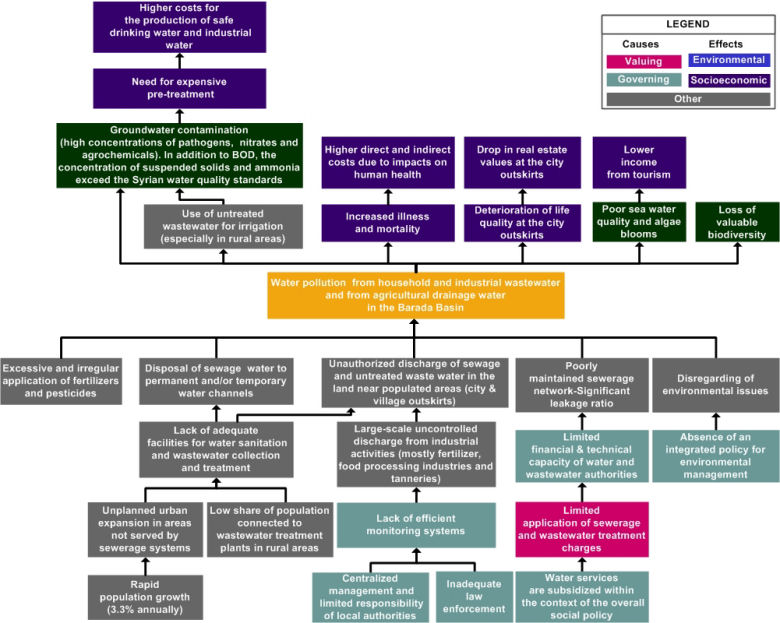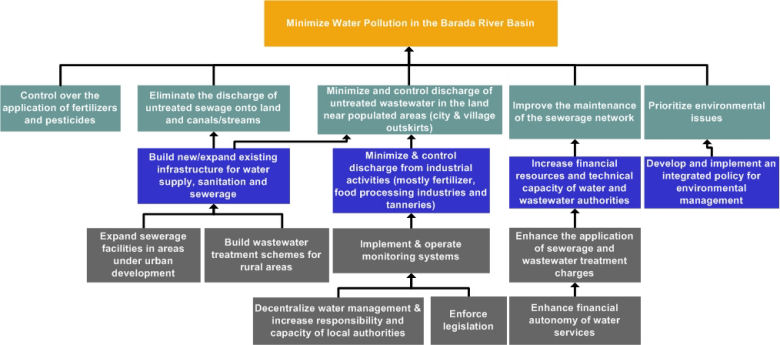
|
 Syria
| |
|
This section is dedicated to local stakeholder discussions on the issue of water pollution experienced in the Barada River Basin, Syria. This page provides a summary of the analyses carried out within the framework of the INECO project, for the analysis of the selected issue, and also includes a tentative definition of objectives corresponding to the mitigation of the problem causes.
For accessing the Local Stakeholder Discussion Forum and the dedicated questionnaires please click the links on the left.
|
|
|
|
| |
| |
|
The Barada Basin extends over an area of 8,630 km² and is located in the southwest part of Syria, and stretches from the western mountainous of Damascus including Sheikh and Kalamon Mountain in the north to the Qunatera and Jolan highlands in the south and from Lebanon in the west to the Syrian Desert in the east. Being the basin where the capital of Syria, Damascus is located, and hence the region that concentrates most of the economic activity and population in the country, the area currently suffers from serious environmental issues. According to the list of policy priorities set by the Ministry of Local Administration and Environment, an immediate action plan should be drafted and implemented in order to address water pollution issues in the Barada Basin. At present, the efforts undertaken in order to address the problem remain incomplete due to: (a) the non-strict enforcement of environmental legislation, (b) legislative limitations, and (c) lack of environmental awareness. Most manufactories discharge contaminants to the sewerage system or simply to land and rivers without treatment, free of charge and without penalties being enforced. In addition, the spatial dispersion of micro- and small-scale industries hinders the effective control over discharges. The current agricultural practices, which include excessive application of fertilizers and pesticides, overexploitation of water resources and application of inefficient irrigation methods have also contributed to the exacerbation of water pollution in the area.
In order to address the problem, a feasible and integrated solution should be developed to mitigate environmental damage and prevent further deterioration in water quality. Considering current economic growth patterns and the emerging need for environmental protection, attempts should be made to develop an optimal policy, reflecting trade-offs between economic development and environmental protection in general, and water resources in particular.
|
| |
| |
|
An analysis of water pollution causes and effects
|
|
|
|
On a first level, causes to the problem comprise include the discharge of untreated sewage and industrial effluents. Illegal connections to networks and arbitrary disposal of sewage onto lands in the vicinity of populated areas, resulting also from the lack of infrastructure is rather common. With regard to industrial wastewater, the pertinent legislation imposes pre-treatment prior to discharge to the sewerage network. However, sometimes industrial wastewaters are mixed with municipal wastewater, without the required pretreatment. Finally, the current agricultural practices, which, in some cases, involve the uninformed and uncontrolled excessive application of fertilizers, contribute to the exacerbation of the problem. Nitrate and ammonia ions’ concentrations in some wells in the Damascus countryside have exceeded the standards for drinking water quality. Furthermore, the irrigation with untreated sewage water, and discharge to the agricultural land of the Ghouta add to the problem. The current water pricing system can be considered inefficient, as sewage collection and wastewater treatment costs are not charged to the users. Furthermore, costs for industrial wastewater treatment are not recovered, whereas fines for exceeding the current discharge standards are not applied. Currently, the decreasing ability of industry to pay wastewater fees, the poor management and maintenance of industrial wastewater treatment plants, the absence of periodical monitoring and poor law enforcement play an important role. The limited financial resources and capacity of water and wastewater service providers, resulting also from poor cost recovery, inhibit the expansion of existing and implementation of new sanitation programmes and wastewater treatment infrastructure. Furthermore, erosion of existing sewerage systems, resulting also from poor maintenance is reported.
Overall, and with regard to decision-making, it can be argued that the strong centralization of water management responsibilities results in a reduced flexibility of local water authorities. Furthermore, there is a slight overlap in responsibilities, which requires the implementation of coordination and data and information exchange mechanisms. It can be argued that the current absence of an integrated environmental management approach, specifically targeting the industrial sector is an important cause to the problem. There is no joint strategy or action plan, based also on the coordination of the efforts of the different ministries and institutions involved. This is partly due to bureaucracy, but also to the lack of expertise and experience in dealing with such issues. The analysis of measurements from monitoring stations shows that there is significant deterioration of both aquatic ecosystems and groundwater quality. Reported effects to the problem involve the deterioration of water quality in both ground and surface water, which leads to considerable environmental damage and inhibits their use for industrial, agricultural and potable water supply. The authorities were forced to stop in 2006, the implementation of a plan for the drilling of more than 200 wells for potable water supply in several regions of Ghouta, as nitrate concentrations were found in the range of 100-200 mg/l (the drinking water quality standard is equal to 40 mg/l). Furthermore, surface waters are becoming more and more polluted, affecting ecosystems and reducing the economic and recreational values of the waters and the surrounding environment. The increased nutrient and pollutant levels, as well as decreased oxygenation, impact seriously on local ecosystems. As a result, there are treatment problems, both in terms of effectiveness and cost, which in some cases have led to the need for implementing expensive pre-treatment to guarantee the safety of potable and industrial supplies. Finally, the uncontrolled discharge of toxic compounds, mostly from lead foundries and battery manufacturing units is also caused soil pollution problems in the region.
Secondary effects to the problem involve significant health risks (e.g. through bathing in polluted water or through the consumption of contaminated shellfish), the higher costs required for producing safe drinking and industrial water, the loss of income from fisheries and aquaculture, the loss of valuable biodiversity, the drop in real estate values, as a result of the deteriorating surrounding environment, especially at the city outskirts, and negative impacts on agricultural production, resulting from the use of untreated water for irrigation purposes.
A summary of the above is outlined in the following Figure.

|
| |
| |
|
Towards defining objectives
|
|
|
|
The following Figure outlines a preliminary set of objectives that should be met for achieving the goal of improving water quality in the Barada River Basin.

Overall, it can be argued that the development and implementation of new tools, like the “polluter-pays” principle, and cost recovery schemes, in combination to incentives for adopting environmentally-friendly practices and subsidies/grants for improving technology is required. Overall, the proposed tools should:
-
Discourage environmentally damaging behavior, such as the discharge of untreated industrial waste that may impact on water quality and the environment in general,
-
Provide incentives for industry to conserve/recycle water and treat produced wastewater and,
-
Assist businesses to improve environmental performance and invest in technologies that favour minimum water use and maximum recycling.
|
| |
|

| |
|
Syria Web Forum Announcements
|
|
|
There are no new announcements!
|
|
|
| |
|